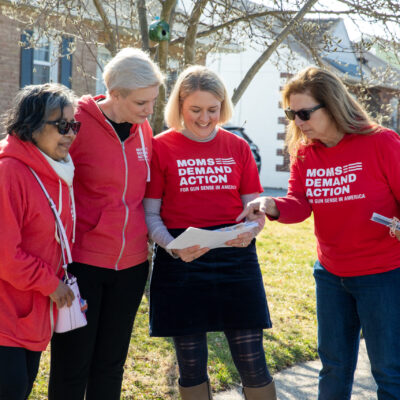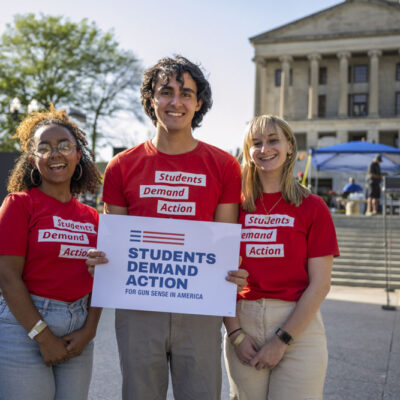Federal Advocacy

Everytown for Gun Safety Action Fund translates our grassroots power into federal action. Through our work with the White House, federal agencies, and Members of Congress and their staff, we ensure policymakers are equipped with the research, policy know-how, and support they need to win gun safety victories at the federal level. Our advocacy led to the passage of the Bipartisan Safer Communities Act—the first major gun safety law in nearly 30 years—and the bipartisan confirmation of the first ATF director in seven years.
Our advocacy also led to:
- Historic executive actions to address gun violence, including combating deadly, untraceable ghost guns, helping close loopholes in the background check system, and regulating arm-brace-equipped assault weapons
- The development of a comprehensive strategy to address gun violence that includes efforts to fight gun trafficking and to encourage secure gun storage
- Record investments in community violence intervention programs
Everytown works with leaders across the federal government and on both sides of the aisle to advance smart, data-driven, pragmatic gun violence prevention legislation, executive action, or regulations and to stop the gun lobby’s dangerous, “guns everywhere” agenda that would put more guns in more hands in more places.
Our grassroots network—including not only Moms Demand Action and Students Demand Action volunteers in their red shirts, but also gun violence survivors, veterans, faith leaders, gun owners, and more—are meeting face-to-face with Members of Congress, testifying at and sitting in on committee hearings, and holding elected officials accountable day-in and day-out in Washington, D.C.



Defending Progress and Saving Lives: Federal Policy Priorities
-
Defending Against the Gun Lobby’s Extremist Agenda
The gun lobby’s agenda would put more guns in the hands of more people in more places. It is a clear and present danger to public safety and public health. The gun lobby wants to abolish the Bureau of Alcohol, Tobacco, Firearms and Explosives (ATF)—the nation’s leading federal law enforcement agency responsible for protecting the public from violent crime and gun violence. The gun lobby wants to repeal the parts of the landmark Bipartisan Safer Communities Act that have disarmed more domestic abusers than ever before, blocked nearly 900 gun sales between October 2022 and September 2024 to prohibited purchasers under the age of 21, and required more gun sellers to become licensed dealers and, in turn, run background checks on their customers. The gun lobby wants to create a new federal mandate to force the states with the strongest concealed carry standards to permit people from states with weak or even nonexistent standards to carry concealed weapons in them—eviscerating states’ rights and endangering communities. The gun lobby wants to make it easier to get dangerous weapons like machine guns, short-barreled rifles, and silencers that have been subject to heightened regulation for nearly a century and emerging threats like 3D-printed guns. And the gun lobby wants to make it more difficult for law enforcement to investigate gun crimes by requiring ATF to destroy business records needed to trace firearms recovered at scenes. The gun lobby’s agenda is as extreme as it is dangerous, and it must be stopped.
Defending against the gun lobby’s extremist agenda means supporting ATF, protecting the Bipartisan Safer Communities Act, and rejecting concealed carry reciprocity as well as other efforts to deregulate dangerous weapons and hamstring law enforcement’s ability to investigate gun crimes.
-
Holding the Gun Industry Accountable
For decades, gun makers, dealers, and marketers have lined their own pockets with billions of dollars while the public pays the price. Gun violence kills 125 people in the United States every single day, and wounds over 200 more, and has been the leading cause of death among children and teens in the United States since 2020. The gun industry’s greed and indifference help fuel this crisis. Manufacturers are driven to make and sell deadly products like military-style assault weapons, untraceable ghost guns, and devices that can turn regular firearms into illegal machine guns. Marketers stoke fear in order to sell empty promises of safety. Dealers sell guns to traffickers and straw purchasers that end up in the wrong hands and are used in violent crime. Many of these bad actors are able to get away with it, too, because the gun industry—thanks to a law the NRA helped write 20 years ago—has near absolute immunity and has been allowed to engage in business practices with minimal regulation under laws that haven’t been strengthened since the 1960s.
Holding the gun industry accountable means banning assault weapons and other dangerous products, repealing the gun industry’s immunity, reigning in irresponsible marketing, and increasing oversight of dealers and regulation of the entire firearms supply chain.
-
Reducing Risk and Promoting Responsible Gun Ownership:
More guns do not make us safer. There are more guns than people in the United States, and those guns claim over 46,000 lives each year—injuring twice as many more. Over half those gun deaths are suicides. The remainder are homicides, including domestic violence incidents, mass shootings, unintentional shootings, often involving children, and daily gun violence that never makes the headlines. The U.S. gun homicide rate is 26 times that of other high-income countries. Research is critical to understand the causes of this public health crisis and to inform the public health approach that can help prevent it. Strong laws minimize the risks that come with gun ownership, including secure storage laws that keep firearms away from children, Extreme Risk laws that temporarily disarm those who pose a danger to themselves or others, and domestic violence laws that keep firearms out of the hands of abusers.
Reducing risk and promoting responsible gun ownership means continuing support for public health research, ensuring that gun owners store their guns securely, and giving law enforcement the tools to remove guns from those who shouldn’t have them.
-
Blocking Illegal Gun Access
Background checks save lives—keeping guns out of the hands of individuals like convicted felons and domestic abusers who have long been prohibited from purchasing and possessing firearms. Since 1994, the background check system has blocked more than 4 million gun sales to prohibited persons. But there’s a problem: Not all gun sales are subject to background checks because not all gun sellers are required to run them—even those who sell guns at gun shows and online. Unlicensed dealers and their no-background-check sales aren’t the only loopholes that undermine the background system and endanger the public. For example, a dealer can transfer a gun to a purchaser before the check is completed if it takes longer than three business days. This loophole alone has put more than a million guns in the hands of prohibited persons, including the shooter who killed nine Black Americans at the Emanuel AME Church in Charleston, South Carolina in 2015.
Blocking illegal gun access means expanding background checks to all gun sales and closing loopholes in the background check system.
-
Supporting Community-Based Interventions
Gun violence does not happen in a vacuum. There are longstanding structural and systemic inequities in health care, education, housing, workforce development, and criminal justice that contribute to gun violence in communities all across the United States. As a result, gun violence has a disproportionate impact on communities of color: Black Americans are more than 12 times more likely to die from gun homicide than white Americans, Native Americans are more than 4 times more likely, and Latinx people more than 2 times more likely. But the daily gun violence that these communities face can be prevented through community-led violence intervention programs. These programs provide evidence-informed support to individuals who are at the greatest risk of gun violence and work to prevent that violence through proven public health interventions that reduce gunshot wounds and gun deaths, and help break the cycle of violence. For example, street outreach programs use credible messengers to mediate conflicts in their own communities. Hospital-based programs enable medical professionals to provide gunshot victims and their families with long-term support to heal, prevent retaliation, and remain safe. Youth development and mentorship programs create safe spaces for young people to learn life skills, form bonds with their peers, and navigate trauma and challenges together. Looking ahead, violence intervention programs need increased support to meet the needs of frontline workers and the communities these programs serve.
Supporting community-based interventions means providing the funds and resources these programs need to prevent gun violence and to help impacted individuals and communities heal and rebuild.
-
Disarming Hate
Hate-motivated gun violence is a persistent and pervasive threat in the United States. On average, more than 25,000 hate crimes involve a firearm each year. Firearms make hate- and extremism-motivated violence all the more violent and all the more likely to turn deadly. But federal law doesn’t block individuals who have been convicted of misdemeanor hate crimes from purchasing or possessing firearms. Time and again, hate-fueled shootings and other violent acts have targeted communities of color and other protected groups, including shootings that targeted Black Americans in Charleston and Buffalo, Jewish Americans in Pittsburgh and Poway, LGBTQ+ individuals in Orlando and Colorado Springs, Latinx individuals in El Paso, and AAPI communities in Atlanta. Like hate crimes, armed extremism is another clear threat to the public—intended to intimidate, silence, and even injure in the name of ideology. In October 2020, DHS described violent white supremacists as “the most persistent and lethal threat” to the Homeland. Years later, that’s still true. DHS and other federal agencies have repeatedly assessed that these domestic violent extremists, among others, continue to be a threat to racial and ethnic minorities, the LGBTQ+ community, and other vulnerable groups as well as sensitive places. For extremists looking to commit these acts of violence, firearms are their most obvious weapon.
Disarming hate means preventing those who have committed hate crimes from obtaining firearms and using every available tool, such as Extreme Risk laws, to keep guns out of the hands of extremists.
Find Your Representatives
Use our lookup tool to find your federal representatives and their social media pages. Every channel is an opportunity to tell them to prioritize gun safety.




